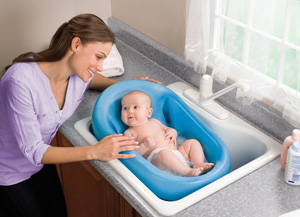The first trimester blues

Early pregnancy isn’t all plus signs and happy secrets. Although the first trimester is filled with excitement and anticipation, it’s also infused with its share of aches and pains. But common mom-to-be woes can be survived with a few proactive measures.

Persistent tiredness may well be the first indication of your baby on board. The bad news: There is no magic fix for this. You’re going to be weary for a while. However, there are things you can do to combat the exhaustion and boost your energy.
Sleep. When you’re tired, the obvious cure is to get some sleep. Try hitting the hay an hour earlier at night or sleeping in on the weekends (but note that sleeping too late into the day can upset your circadian rhythm and actually leave you more worn-out in the long run). Nap during the day when you can, even if it’s only a quick catnap on the couch when you get home from work. If extra sleep isn’t an option, focus on resting whenever possible.
Eat well. A healthy diet can make a positive impact on your energy levels. “Eat healthy meals and snacks that won’t result in huge swings in your glucose levels,” advises Christine Greves, MD, member of the Center of Obstetrics and Gynecology at Winnie Palmer Hospital for Women and Babies in Orlando, Florida. To accomplish this, aim for six small meals each day rather than three large ones.
Also try avoiding foods with high sugar content. “You might think that eating a candy bar will give you energy, and temporarily, it definitely will,” says Greves. “However, after that quick surge, you’ll suffer from a swing in your blood sugar levels, making you more tired.” Another tip to remember: Proper hydration helps.
Exercise. It might seem counterintuitive to exercise when you’re tired, but staying active during the day helps you sleep better at night—and the release of endorphins you experience after a prenatal workout will give you an immediate boost in energy and spirit. If you’re exhausted and rest isn’t an option, try a brisk walk around the block instead.
Nausea
As most expectant mothers quickly realize, the term “morning sickness” is misleading. Few moms experience sickness only in the mornings; it’s usually an all-day affair. The proper—and more accurate—term for prenatal sickness is nausea and vomiting of pregnancy, or NVP for short. Diana Ramos, MD, MPH, FACOG, medical director for reproductive health for the Los Angeles Public Health Department and associate clinical professor in obstetrics and gynecology at the Keck University of Southern California School of Medicine, says up to 85 percent of pregnant women may experience NVP.
If you’re part of that majority, look to your diet first to ease the quease. Avoid foods that are greasy (french fries and fried chicken are two common offenders) or particularly pungent. Greves prescribes eating small, carbohydrate-containing meals (think saltine crackers) if you’re having trouble holding down food. Keep something in your stomach at all times—now’s the time to nibble—and drink plenty of water.
Although different tricks work for different people, there are a number of things you can try to soften your sickness. Ginger is effective for many moms-to-be. “Acupressure and nausea bands may also provide relief for some women,” Ramos adds. Teas and supplements designed to relieve the tummy troubles of expectant moms are worth a try as well. Finally, your practitioner might recommend a vitamin B6 supplement—but talk to her before adding it on your own.
For the most part, NVP is nothing more than an annoyance and will pass in time. In some pregnancies, though, it can become problematic. If you’re unable to keep anything down—even liquids—and are feeling dizzy or aren’t able to urinate, your OB or midwife will want to know. You could be dehydrated or, in rare cases, be suffering from a more severe condition called hyperemesis gravidarum. Ramos suggests cluing in your provider if NVP is interfering with your daily routine, as there may be alternative solutions available.
Bloating and gas
“During the first trimester of pregnancy, a woman’s progesterone level is very high,” says Greves, which causes the smooth muscles in your body to dilate—including those in your gastrointestinal tract. This dilation slows down digestion, which can cause uncomfortable bloating and gas.
Step one in fixing this problem is avoiding it: Cut gas-causing foods like beans and broccoli out of your diet. (Greves proposes cutting them out one at a time to find the culprit because many foods that cause gas also have some pretty nice health benefits.) Foods high in sugar and carbonated beverages can also cause discomfort.
If bloating is a recurring problem, work it out—literally. “Increasing one’s activity helps,” Greves says, because movement can boost your sluggish digestive tract.
Constipation
Your tamed-down GI tract causes another common first-trimester complaint: constipation. Regular exercise can get things moving again, as can increasing the fiber in your diet. (Avocados and berries are two tasty fiber-fueled options.) Again, hydration is important, too.
The market is full of stopped-up solutions, and some are approved for (and even designed for) expectant moms. However, Greves recommends that moms try lifestyle changes before turning to medication. But if you’re eating properly, moving regularly throughout the day, drinking an abundance of water and still suffering from constipation, your doctor might recommend a docusate sodium tablet to help soften your stools. “It’s important to avoid prolonged constipation,” Greves notes, so don’t be afraid to speak up if you’re backed up.
Breast tenderness
The hormonal surge of the first trimester brings with it an unwelcome friend: sore breasts. They will likely be very tender, but other than treating them gingerly (hands off for now, partner) there isn’t much you can do. Be sure your bra is providing good support, but don’t splurge on too many new undergarments just yet—the girls will continue to grow and change throughout your pregnancy. To keep things comfortable at night, invest in a cotton sports-style bra.
Acne
Your hormones are also to thank for the acne à la seventh grade that’s suddenly popping up on your face. The fact that many of your go-to treatments, like salicylic acid, are now off-limits surely doesn’t help.
Michele McRae, certified nutritionist and senior director of product development at Rainbow Light, advocates for beauty from the inside out. In other words: Eat well, and take your prenatal vitamin daily. “Just like high-quality fuel keeps our cars running smoothly, a healthy diet…will keep a mom’s body functioning optimally and help keep her skin looking its best.” McRae cites appropriate amounts of vitamin C and zinc (both of which are included in most multivitamins) as some of the most important nutrients for skin health.
Oil production often increases during pregnancy, so look for pure, natural prod- ucts that are oil-free. “A gentle soap is best for cleansing,” offers Greves. Products geared toward the expectant crowd are typically your best bet, but you’ll also find usable options at your local drugstore. Just skim the ingredient list carefully, and ask your doctor before using anything that you aren’t 100 percent sure is on the all-clear list.
Good habits will make a difference, too: Wash your face every morning and night, even when you’re exhausted, and drink plenty of water.
Most moms find that their acne clears on its own with time. In extreme cases when an acne outbreak is affecting a mother’s quality of life, a medicated treatment might be necessary. If that’s the case, use only formulas that have been approved and prescribed by your doctor; no over-the-counter fixes for now.
Headaches
According to Greves, “The increase in body fluid and hormonal changes can contribute to headaches in early pregnancy.” And if you’re suffering from caffeine withdrawal, you’ll be dealing with a double whammy. Stress can factor in, too—so what’s a mom to do?
Diet. If you’re recognizing a pattern here, it’s because there is one. Sticking to a healthy lifestyle and eating right are huge factors in easing pregnancy related ailments, including headaches. Greves suggests avoiding blood sugar level spikes and falls.
Temperature. Applying a cold pack directly to your head commonly relieves pain; for some moms, heat might be a better option. Try both to figure out which one works best for you.
Massage. Greves advises trying a temple massage in case tense muscles are the source of your pain.
Ambiance. Avoid bright lights or loud noises when you’re suffering from a bad headache. A dark, quiet place is ideal to lie down and rest for a bit. Stepping out for a bit of fresh air or taking a warm shower, particularly if you’re suffering from sinus congestion, can offer relief as well. As a last resort, your doctor might suggest a pregnancy-approved pain reliever.







